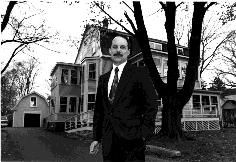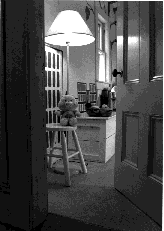
People want to believe that Marblehead has no
problems. People want to believe that historic  Marblehead
is a sanctuary from the troubles that beset other communities:
drugs, violence, and people who cannot cope and take it out on
others. People want to believe that, so do we all; but the professionals
of the Marblehead Community Counseling Center know better. Every
day they live the reality that others try to avoid. Marblehead
is a sanctuary from the troubles that beset other communities:
drugs, violence, and people who cannot cope and take it out on
others. People want to believe that, so do we all; but the professionals
of the Marblehead Community Counseling Center know better. Every
day they live the reality that others try to avoid. The Marblehead Community Counseling Center celebrates its twenty-fifth anniversary this fall. Through the years, over 7000 Marblehead residents have been directly helped and served by the Counseling Center's vital programs.  Marblehead Magazine
asked Director Paul Crosby (above) to give our readers an overview
of the Center's programs and what they do. Marblehead Magazine
asked Director Paul Crosby (above) to give our readers an overview
of the Center's programs and what they do. To many, MCCC is a doorway rebuilding lives. Counseling is the MCCC's main purpose. Therapy is aimed at everyday people, people who need help with marriages, relationships, children, single parenting, recovering from sexual, physical and substance abuse, and (especially since the recession) with stress-burdened money issues. The Counseling Center is licensed as a drug and alcohol outreach program. The social work aspects to the Counseling Center's work help the elderly, help people with winter fuel problems and help to find housing for people who otherwise would be dispossessed. "The local welfare office closed in the mid 70's," explained Paul Crosby. "Now there are regional offices. But there is really no one there who knows the local community in Marblehead. That's why the Counseling Center is so different and so important. We focus only on Marblehead. We do a lot of community organizing behind the scenes. We're not regional, we know the town's people, and we help them find support within our community." This dedicated community approach defines the Marblehead Community Counseling Center. It is also different from private individual therapy because individuals and families are treated the context of the community, rather than in the isolation of a clinical office. Our pride of community creates solutions where others find none. Beyond individual and group therapy, the Counseling Center is deeply involved in community action. An important focus of the MCCC is education. While community education at one time was mainly about mental illness, it has now become more inclusive and practical, encompassing issues about anxiety and concerns about finances, parenting and domestic violence. A new community education program, financed by grants, is called Compass: New Directions for Growth. The Compass program is based on two premises. One is that people need to learn skills to handle stress and avoid its associated calamities, and the other is that the 90's are a time when people are reevaluating their value structures and their priorities to include broader life values than just money and success. Another new program at the Counseling Center is mediation. Trained mediators will help to resolve issues between neighbors, tenant and landlord, or within families without a court or arbitrator laying down the law. Instead, through mediation, parties listen to each other and, with the guidance of the mediator, work out a solution together. The Counseling Center's community work on task forces and committees has been extensive, with recent involvement in the Health Advisory Council for the public schools, the AIDS Awareness Committee, the Violence Prevention Committee, and the Hard Times group. As Paul Crosby says, "We seek to become part of the social fabric of our town, to help to improve the systems around us." Who is served by the Marblehead Community Counseling Center? The Center's mission is to serve only people who live or work in Marblehead, regardless of ability to pay. Fees are collected on a sliding scale from $15 to $60 per hour, well below the industry norms. "We do a lot of work with people who can't afford full fees, or don't have insurance, or  whose
insurance for mental health services has run out," explained
Mr. Crosby. whose
insurance for mental health services has run out," explained
Mr. Crosby. Paul Crosby and his staff discuss the day's issues. "Because Marblehead's median gross individual income is $33,000 annually, twelfth in the state, there is sometimes no general perception of any lower income needs here. But it exists, nonetheless." In fact, Marblehead Magazine looked at some statistics from the 1990 census and some figures on the income of people seen at the Counseling Center in 1993 and discovered that there is a significant spread of middle-to-low income households in Marblehead. Eighty-six percent of the people seen at the Counseling Center in 1993 came from households that had annual take home pay of less than $20,600. The Community Counseling Center is funded from three main sources: the town's annual budget, private fundraising, and fees from clients. In some sense, then, this valuable community resource is at the mercy of the Finance Committee's recommendations to Town Meeting. Five or six years ago, the town budget allocated $163,000 to mental health services. Gradual cutbacks through the recession reduced the town's budget commitment to the Community Counseling Center to $90,000 five budget years later. The difference has been made up through increased fundraising by an active Board of Directors, increased fee collection, tightening operations, and some reduction of staff hours. During the five years Paul Crosby has been at the Counseling Center, he has seen fundraising increase from $18,000 annually to $62,000. There does seem to be some concern about continued town funding for the Community Counseling Center, in light of the steady funding decrease, and the fact that cutting the Counseling Center altogether has been discussed for the last two years at Finance Committee meetings. It is the Board of Selectmen's role to set priorities for the town budget, however, and Tom McNulty, Chairman of the Board of Selectmen, was clear in his support of the Counseling Center when Marblehead Magazine talked to him. "The Marblehead Community Counseling Center provides a valuable service," stated Mr. McNulty," and I cannot think of any circumstance that would lessen the Board of Selectmen's commitment to the Community Counseling Center both from the economic point of view and a policy point of view." Mr. Crosby was most definite in his opinion that one of Marblehead's strengths as a town is the high level of community involvement of the people. The Community Counseling Center is part of the equilibrium, the balance of services, that makes the community work. Practically speaking, without the Marblehead Community Counseling Center, there wouldn't be any publicly-funded social services in town, since state and federal funding are regional, and Marblehead is defined as an affluent town. Regional services would focus on major problems of cities like Lynn and Salem. Marblehead would lose local control. If services were regionalized, we lose the ability to define our own town needs and allocate our own resources to solve those needs. The Community Counseling Center, besides counseling indivduals and families in a community based way, fills gaps in the community. The Center has helped to define community needs, and to develop and provide leadership support to local groups such as the Affordable Housing Committee, the Hard Times Committee, AIDS Awareness, and Drug and Alcohol Awareness. The mission of the Marblehead Community Counseling Center is to contribute to improving the quality of life for the entire community, and provide services regardless of an individual's ability to pay. A community base and community support is part of the definition of the Counseling Center. In supporting the Marblehead Community Counseling Center, our town truly invests in helping itself. Susan Butterworth is a freelance writer who often contributes to Marblehead Magazine. |